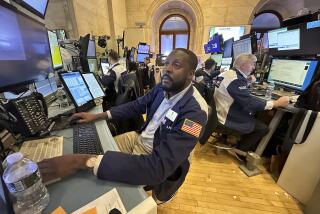Bond Yields Fall as Fed Gathers; Stocks Are Flat
- Share via
Long-term bond yields fell Monday to their lowest level in a month, as the chances of a credit-tightening move by the Federal Reserve Board continued to ebb.
But the stock market took little comfort in bonds’ rally, and most stock indexes closed marginally lower or up just slightly.
The Dow Jones industrials slipped 6.93 points to 6,806.16, after trading in a narrow range all day.
Winners topped losers by 14 to 11 on the New York Stock Exchange, while losers had a narrow edge on Nasdaq. Trading volume was moderate.
The bulls all seemed to be in the bond market Monday. The bellwether 30-year Treasury bond yield dropped from 6.78% Friday to 6.74%, the lowest since Jan. 3 and well off from its recent high of 6.94%.
Bonds rallied after the National Assn. of Purchasing Management reported that growth of the nation’s manufacturing economy slowed in January following months of sustained strength.
The NAPM report, one of the earliest readings on January’s economic activity, should assure that Federal Reserve board members, meeting today and Wednesday to review short-term interest rates, will leave them unchanged, many economists said.
“I don’t think the Fed will need to act,” said John Breazeale, who manages about $160 million in bonds for Weiss Money Management in Palm Beach Gardens, Fla.
Although a number of economic reports over the past month showed surprisingly robust readings--raising the specter of a Fed credit-tightening move to brake growth--last week the central bank got good news in the form of the fourth-quarter gross domestic product growth report.
That report showed strong growth in the quarter, but subdued inflation. “We’re having growth and no build-up of inflationary pressures,” said Alan Day, who helps manage about $900 million at Stratevest Group in Burlington, Vt.
But why stocks aren’t responding to bonds’ rally is anyone’s guess, traders said. “We’re just seeing the market take a bit of a rest from a pretty fast start in January,” said Jim Weiss, deputy chief investment officer for equities at State Street Research & Management Co. in Boston.
“It’s like hurry-up-and-wait time” for stocks, said Robert Froehlich, chief investment strategist at Van Kampen American Capital.
Even so, Monday saw the Standard & Poor’s 500-stock index eke out a record high, inching up 0.57 point to 786.73.
Among Monday’s highlights:
* Some investors turned to classic growth stocks, which often function as “safe havens” when people aren’t sure what else to buy. Philip Morris jumped 3 1/2 to 122 3/8, Coca-Cola gained 1 5/8 to 59 1/2 and Procter & Gamble added 3/8 to 116.
* Tech issues on the positive side included Intel, up 1 5/8 to 163 7/8; Sun Microsystems, up 1 1/8 to 32 7/8; and Microsoft, up 3/8 to 102 3/8.
But Texas Instruments lost 2 5/8 to 75 3/4, Applied Materials fell 1 3/8 to 48, 3Com sank 5 1/8 to 62 and IBM was off 2 to 154 7/8.
* Financial stocks were able to muster some momentum from the bond market’s gains. Citicorp rose 2 to a record 118 3/8, Chase Manhattan gained 1 1/4 to 93 3/4 and BankAmerica rose 1 5/8 to 113 1/4. BankAmerica raised its dividend 13% and said it will buy back $3 billion more in stock.
* Kysor Industrial jumped 5 5/8 to 42 5/8 after the company agreed to a buyout by Scotsman Industries. Scotsman, which agreed to pay $43 cash for each Kysor share, rose 2 1/8 to 26 1/8.
* Among companies responding to earnings reports or previews, Transocean Offshore slid 5 1/2 to 60 after warning of weak fourth-quarter earnings.
Also, New York Bagel Enterprises skidded 2 1/8 to 4 5/8 after the company said its quarterly earnings would be lower than expected.
* In the retail sector, Wet Seal jumped 1 3/8 to 21 1/2, Gadzooks gained 5/8 to 28 3/4 and Urban Outfitters rose 1 1/8 to 13 1/4, after Barron’s reported that teen-oriented retailers are getting a boost from young women who are trading in the grunge look for dressier wardrobes.
In currency trading, the dollar rose after Japanese Prime Minister Ryutaro Hashimoto suggested the world’s leading nations won’t join to weaken it.
His remarks countered speculation that central bankers and finance ministers from the Group of Seven countries would oppose further gains by the dollar when they meet in Berlin on Saturday. The G-7 are the U.S., Japan, Germany, France, the U.K., Italy and Canada.
The dollar rose to 121.71 yen in late New York trading from 121.30 Friday, and to 1.6402 German marks from 1.6375.
More to Read
Inside the business of entertainment
The Wide Shot brings you news, analysis and insights on everything from streaming wars to production — and what it all means for the future.
You may occasionally receive promotional content from the Los Angeles Times.










